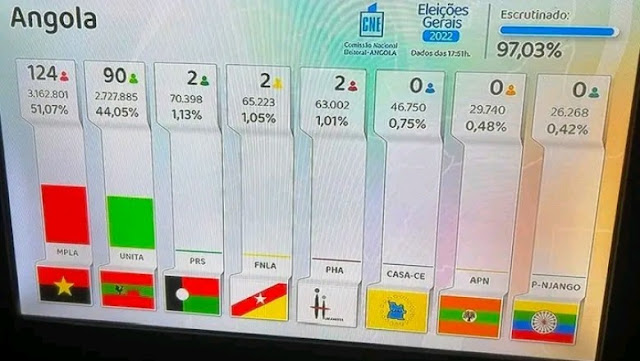Say No to Violence
The International Day of Non-Violence is observed on 2 October, the birthday of Mahatma Gandhi, leader of the Indian independence movement and pioneer of the philosophy and strategy of non-violence.
Most popular types of violence in Angola
"Non-violence is the greatest force at the disposal of mankind. It is mightier than the mightiest weapon of destruction devised by the ingenuity of man". Here we are showing the most popular types of violence in Angola.
#AngolaElections2022: gunshots fired and protesters angry on Luanda streets following claims of “fraudulent” presidential elections
MPLA won the August 24 general elections with 51.7 percent of the votes - UNITA with 44.5 and 90 elected deputies
The National Electoral Commission (CNE) released the "definitive" provisional electoral results of the August 24 general elections announcing a victory by an absolute majority for the MPLA, which reaches 51.7 percent and elects 124 deputies. UNITA is second with 44.5 percent and 90 elected deputies.
CASA-CE, until now the 3rd largest parliamentary group in the National Assembly, does not elect any deputies.
Luanda protest against MPLA
Scene 1
#AngolaElections2022 conflict sparks on Luanda streets with protests about “controversial” election results and the “early” announcement of a win for MPLA
Mass Manifestation
UNITA parallel map
UNITA challenges the national electoral commission to present true data based on the summary minutes
Police show revolt against the MPLA
Source: https://angola-online.net/amp/news/12205
Domestic violence and child abuse is also a problem in Angola
Violence against minors in Angola with almost 200 thousand cases
The Angolan Government considered today that violence against children in the country "has reached extremely worrying levels", with the registration of more than 199,000 cases in the last two years, of which 8,490 were victims of sexual violence.
We designed an Anti-harassment chatbot named BabyScream to help victims of child marriage, domestic violence and sexual abuse, denounce harmful practices.
According to General Assembly resolution A/RES/61/271 of 15 June 2007, which established the commemoration, the International Day is an occasion to "disseminate the message of non-violence, including through education and public awareness". The resolution reaffirms "the universal relevance of the principle of non-violence" and the desire "to secure a culture of peace, tolerance, understanding and non-violence".
Introducing the resolution in the General Assembly on behalf of 140 co-sponsors, India’s Minister of State for External Affairs, Mr. Anand Sharma, said that the wide and diverse sponsorship of the resolution was a reflection of the universal respect for Mahatma Gandhi and of the enduring relevance of his philosophy. Quoting the late leader’s own words, he said: "Non-violence is the greatest force at the disposal of mankind. It is mightier than the mightiest weapon of destruction devised by the ingenuity of man".
Background
The life and leadership of Mahatma Gandhi
Gandhi, who helped lead India to independence, has been the inspiration for non-violent movements for civil rights and social change across the world. Throughout his life, Gandhi remained committed to his belief in non-violence even under oppressive conditions and in the face of seemingly insurmountable challenges.
The theory behind his actions, which included encouraging massive civil disobedience to British law as with the historic Salt March of 1930, was that "just means lead to just ends"; that is, it is irrational to try to use violence to achieve a peaceful society. He believed that Indians must not use violence or hatred in their fight for freedom from colonialism.
Definition of Non-Violence
The principle of non-violence — also known as non-violent resistance — rejects the use of physical violence in order to achieve social or political change. Often described as "the politics of ordinary people", this form of social struggle has been adopted by mass populations all over the world in campaigns for social justice.
Professor Gene Sharp, a leading scholar on non-violent resistance, uses the following definition in his publication, The Politics of Nonviolent Action:
"Nonviolent action is a technique by which people who reject passivity and submission, and who see struggle as essential, can wage their conflict without violence. Nonviolent action is not an attempt to avoid or ignore conflict. It is one response to the problem of how to act effectively in politics, especially how to wield powers effectively."
While non-violence is frequently used as a synonym for pacifism, since the mid-twentieth century the term non-violence has been adopted by many movements for social change which do not focus on opposition to war.
One key tenet of the theory of non-violence is that the power of rulers depends on the consent of the population, and non-violence therefore seeks to undermine such power through withdrawal of the consent and cooperation of the populace.
There are three main categories of non-violence action:
- protest and persuasion, including marches and vigils;
- non-cooperation; and
- non-violent intervention, such as blockades and occupations.



.jpg)
No comments:
Post a Comment